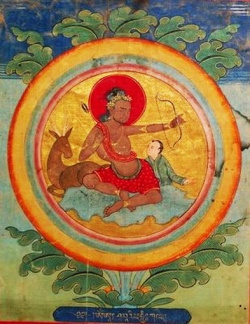Difference between revisions of "Shavaripa"
| Line 1: | Line 1: | ||
[[File:Shavaripa00.jpg|thumb|250px|]] | [[File:Shavaripa00.jpg|thumb|250px|]] | ||
| − | {{BigTibetan|[[ཥ་ཝ་རི་པ]]།}}; [[Śavaripa]]; [[Shavaripa]]; The Hunter; | + | {{BigTibetan|[[ཥ་ཝ་རི་པ]]།}}; [[Śavaripa]]; [[Shavaripa]]; The {{Wiki|Hunter}}; |
---------- | ---------- | ||
| − | '''[[Shavaripa]]''' (Skt. ''[[Śāvaripa]]'' ; [[Wyl.]] ''[[sha ba ri pa]]'' or ''[[ri khrod dbang phyug]]''), the 'Hunter' — one of the [[eighty-four mahasiddhas]] of [[India]]. [[Shavaripa]] was a hunter who turned to the [[Buddhist]] path and renounced his livelihood after an encounter with the [[bodhisattva]] [[Avalokiteshvara]]. He later became a disciple of [[Nagarjuna]] and a teacher of [[Maitripa]]. [[Shavaripa]] is a key figure in the transmission of the early [[Mahamudra]] lineage of teachings in [[India]], and counted among the 'Indian Patriarchs' of the [[Kagyü]] lineage. | + | '''[[Shavaripa]]''' (Skt. ''[[Śāvaripa]]'' ; [[Wyl.]] ''[[sha ba ri pa]]'' or ''[[ri khrod dbang phyug]]''), the '{{Wiki|Hunter}}' — one of the [[eighty-four mahasiddhas]] of [[India]]. [[Shavaripa]] was a {{Wiki|hunter}} who turned to the [[Buddhist]] [[path]] and renounced his [[livelihood]] after an encounter with the [[bodhisattva]] [[Avalokiteshvara]]. He later became a [[disciple]] of [[Nagarjuna]] and a [[teacher]] of [[Maitripa]]. [[Shavaripa]] is a key figure in the [[transmission]] of the early [[Mahamudra]] [[lineage]] of teachings in [[India]], and counted among the '[[Indian]] [[Patriarchs]]' of the [[Kagyü]] [[lineage]]. |
==Further Reading== | ==Further Reading== | ||
| Line 15: | Line 15: | ||
{{NewSourceBreak}} | {{NewSourceBreak}} | ||
| − | [[Shavaripa]] was an [[Indian]] [[Mahasiddha]] who figures prominently in the early [[lineage]] of the [[Mahamudra]] [[transmission]]. [[Nothing]] much is known about him. Apparently he was a {{Wiki|hunter}} who was dissuaded from his [[evil]] livelyhood by [[Avalokiteshvara]] himself. The [[Bodhisattva]] appeared to him and boasted of being the better {{Wiki|hunter}} of the two. He challenged [[Shavaripa]] to a competition and said he could kill 100 [[animals]] (which were his own [[emanations]]) by shooting a single arrow, which he proceeded to do. [[Shavaripa]] could not compete. [[Avalokiteshvara]] then showed [[Shavaripa]] the [[hell]] reamls in which he would be [[reborn]] in the {{Wiki|future}}. Terrified, [[Shavaripa]] abandoned [[hunting]] altogether. | + | [[Shavaripa]] was an [[Indian]] [[Mahasiddha]] who figures prominently in the early [[lineage]] of the [[Mahamudra]] [[transmission]]. [[Nothing]] much is known about him. Apparently he was a {{Wiki|hunter}} who was dissuaded from his [[evil]] livelyhood by [[Avalokiteshvara]] himself. The [[Bodhisattva]] appeared to him and boasted of being the better {{Wiki|hunter}} of the two. He challenged [[Shavaripa]] to a competition and said he could kill 100 [[animals]] (which were his [[own]] [[emanations]]) by shooting a single arrow, which he proceeded to do. [[Shavaripa]] could not compete. [[Avalokiteshvara]] then showed [[Shavaripa]] the [[hell]] reamls in which he would be [[reborn]] in the {{Wiki|future}}. Terrified, [[Shavaripa]] abandoned [[hunting]] altogether. |
| − | He later met the [[Mahasiddha]] [[Saraha]] and the incomparable [[Nagarjuna]], from whom he received [[Mahamudra]] instructions. He practiced these and attained complete {{Wiki|realisation}}. [[Shavaripa]] then passed these instructions on to his [[disciple]] [[Maitripa]], who passed them on to the [[Tibetan]] [[translator]] [[Marpa]]. He was also an important early [[lineage]] [[master]] in the [[transmission]] of the practices of the Six-armed [[Mahakala]] which were then passed from [[Maitripa]] to [[Khedrub Khyungpo Naljor]], the founder of the [[Shangpa Kagyu]] [[tradition]]. | + | He later met the [[Mahasiddha]] [[Saraha]] and the incomparable [[Nagarjuna]], from whom he received [[Mahamudra]] instructions. He practiced these and [[attained]] complete {{Wiki|realisation}}. [[Shavaripa]] then passed these instructions on to his [[disciple]] [[Maitripa]], who passed them on to the [[Tibetan]] [[translator]] [[Marpa]]. He was also an important early [[lineage]] [[master]] in the [[transmission]] of the practices of the Six-armed [[Mahakala]] which were then passed from [[Maitripa]] to [[Khedrub Khyungpo Naljor]], the founder of the [[Shangpa Kagyu]] [[tradition]]. |
{{R}} | {{R}} | ||
[http://rywiki.tsadra.org/index.php/Shavaripa rywiki.tsadra.org] | [http://rywiki.tsadra.org/index.php/Shavaripa rywiki.tsadra.org] | ||
Latest revision as of 08:49, 16 December 2015
ཥ་ཝ་རི་པ།; Śavaripa; Shavaripa; The Hunter;
Shavaripa (Skt. Śāvaripa ; Wyl. sha ba ri pa or ri khrod dbang phyug), the 'Hunter' — one of the eighty-four mahasiddhas of India. Shavaripa was a hunter who turned to the Buddhist path and renounced his livelihood after an encounter with the bodhisattva Avalokiteshvara. He later became a disciple of Nagarjuna and a teacher of Maitripa. Shavaripa is a key figure in the transmission of the early Mahamudra lineage of teachings in India, and counted among the 'Indian Patriarchs' of the Kagyü lineage.
Further Reading
- Keith Dowman
- Masters of Mahāmudrā: Songs and Histories of the Eighty-four Buddhist Siddhas (Albany: State University of New York Press, 1986), Chapter 5, 'The Mahāsiddha Śavaripa, The Hunter'.
- Buddhist Masters of Enchantment: The Lives and Legends of the Mahasiddhas (Rochester: Inner Traditions, 1998), 'Savaripa, The Hunter'.
External Links
Source
Shavaripa was an Indian Mahasiddha who figures prominently in the early lineage of the Mahamudra transmission. Nothing much is known about him. Apparently he was a hunter who was dissuaded from his evil livelyhood by Avalokiteshvara himself. The Bodhisattva appeared to him and boasted of being the better hunter of the two. He challenged Shavaripa to a competition and said he could kill 100 animals (which were his own emanations) by shooting a single arrow, which he proceeded to do. Shavaripa could not compete. Avalokiteshvara then showed Shavaripa the hell reamls in which he would be reborn in the future. Terrified, Shavaripa abandoned hunting altogether.
He later met the Mahasiddha Saraha and the incomparable Nagarjuna, from whom he received Mahamudra instructions. He practiced these and attained complete realisation. Shavaripa then passed these instructions on to his disciple Maitripa, who passed them on to the Tibetan translator Marpa. He was also an important early lineage master in the transmission of the practices of the Six-armed Mahakala which were then passed from Maitripa to Khedrub Khyungpo Naljor, the founder of the Shangpa Kagyu tradition.
